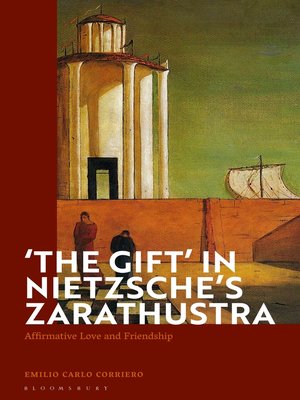'The Gift' in Nietzsche's Zarathustra
ebook ∣ Affirmative Love and Friendship
By Emilio Carlo Corriero

Sign up to save your library
With an OverDrive account, you can save your favorite libraries for at-a-glance information about availability. Find out more about OverDrive accounts.
Find this title in Libby, the library reading app by OverDrive.



Search for a digital library with this title
Title found at these libraries:
| Library Name | Distance |
|---|---|
| Loading... |
Tracing the notion of 'the gift' in Nietzsche's Thus Spoke Zarathustra, Emilio Corriero provides a new interpretation of this essential text, alongside 'the gift's' evolution as a key concept in the history of western philosophy and Christianity.
The last phase of Nietzsche's thought, including his writings on the death of God, The Will to Power, the Overman, and eternal recurrence are analysed anew in Corriero's reading of Thus Spoke Zarathustra. From Nietzsche's Prologue, in which Zarathustra presents the idea of the Overman as a gift of love and wisdom, up to the fourth and final book, in which the theme of hospitality and sacrifice are inextricably linked to the concept of donation, highlighting the novelty and exceptionality of Zarathustra's gift. Building on these ideas, this book reveals how the gift of Zarathustra put forward by Nietzsche rethinks the relationships between individuals based on Christian doctrine, enabling new forms of coexistence and sociality to thrive.
The last phase of Nietzsche's thought, including his writings on the death of God, The Will to Power, the Overman, and eternal recurrence are analysed anew in Corriero's reading of Thus Spoke Zarathustra. From Nietzsche's Prologue, in which Zarathustra presents the idea of the Overman as a gift of love and wisdom, up to the fourth and final book, in which the theme of hospitality and sacrifice are inextricably linked to the concept of donation, highlighting the novelty and exceptionality of Zarathustra's gift. Building on these ideas, this book reveals how the gift of Zarathustra put forward by Nietzsche rethinks the relationships between individuals based on Christian doctrine, enabling new forms of coexistence and sociality to thrive.







